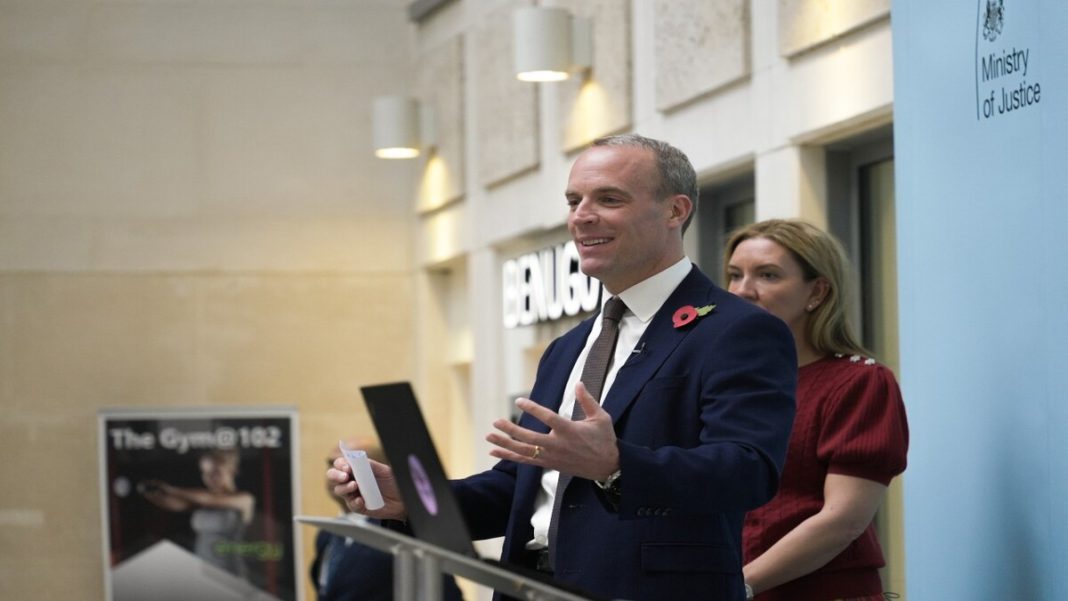UNITED KINGDOM: British Deputy Prime Minister Dominic Raab resigned on Friday after Rishi Suank reluctantly accepted a months-long official investigation that found his close ally bullied colleagues by acting in an aggressive and intimidating manner.
Deputy PM Dominic Raab resigns
After a five-month inquiry by a renowned employment lawyer, Raab was found to have used “abuse or misuse of power” to defame or humiliate employees while serving as the foreign secretary. Meetings at the Ministry of Justice were “intimidating and insulting” because of him.
After departing on Friday, Dominic Raab attacked “activist civil servants,” claiming they were attempting to obstruct government operations. In his testimony to the panel, he stated that the civil service had “culture resistance” to policies, especially those regarding Brexit, and on Friday, he asserted that the bar for bullying was “too low.”
Sources at Downing Street claimed that while Sunak had not requested Dominic Raab’s resignation, the prime minister had accepted the resignation of his former deputy. Sunak lavished praise on Raab in his response to the resignation letter, while No. 10 provided only lukewarm support for the report’s findings. Sunak also questioned historical processes. As a result, the prime minister was charged with failing to defend civil servants.
Dominic Raab, who served as deputy prime minister and justice secretary, had been the subject of numerous formal complaints regarding his interactions with civil servants in three departments, including allegations first published by the British media that he bullied and belittled staff, bringing some of them to tears or making them throw up before meetings.
The probe by Adam Tolley KC discovered that Raab called the work of government workers “utterly useless” and “woeful.” Some employees claimed that working with him caused them tension and anxiety and forced them to take unpaid leave or, in one instance, stress-related sick leave.
Tolley refuted assertions made by some Conservative MPs that civil workers had been “snowflakes,” stating that he had not observed “any material lack of resilience” in those who had “many years of experience” working with ministers.
Dominic Raab was accused of shouting or swearing, but the investigation found “no persuasive evidence” of this and rejected the claims. Raab was in charge of the Brexit department at the time.
However, in a furious opinion article published in the media outlets, Raab scorned a “Kafkaesque saga” and asserted that it would inspire some officials to target ministers who “pursue bold reforms” and “persevere in holding civil servants to account.”
His departure likely represents the end of his active political career, as allies acknowledge that he is predicted to lose his Surrey seat to the Liberal Democrats in the general election of the following year. Before deciding on his future, Dominic Raab told the British media he wanted to “let the dust settle a little bit.”
The resignation of such a close political friend is a serious setback for Sunak, who is under scrutiny for his judgement after civil servants raised “issues” with Dominic Raab in his prior ministries before the prime minister re-hired him.
Sunak skirted over the specifics of the complaints, while Downing Street simply denounced the intimidation of government employees “in general terms” and refused to admit that Dominic Raab had violated the ministerial code.
Sunak said in his letter to Raab that his deputy prime minister had “rightly” promised to resign in the event that any allegations of bullying were found in the investigation. “You have kept your word,” he stated.
“But it is clear that there have been shortcomings in the historical process that have negatively affected everyone involved. We should learn from this how to better handle such matters in the future,” his letter further reads.
He continued by praising Dominic Raab’s accomplishments and assistance during the Tory leadership race. While rejecting requests for a wider investigation of ministerial bullying, Downing Street said that there might be lessons to be learned in how complaints are handled.
In his letter of resignation, Raab stated that the report’s findings set a “dangerous precedent” by lowering the bar for bullying to the point that it may have a “chilling” impact on ministers trying to enact reform.
Dominic Raab declined to apologise. Tolley stated, “The DPM expressed regret over the effect on people, which was disclosed to him for the first time during the course of the inquiry. Given that he rejects the notion that he did anything wrong, he has not shown regret.”
However, Raab said, “I apologise profusely for any unintended tension or offence that any officials may have experienced as a result of the pace, calibre, and level of difficulty that I brought to the Ministry of Justice.”
Sunak had come under fire for allowing Raab to remain in his position while Tolley’s probe was ongoing. Raab was the second member of Sunak’s cabinet to be forced to resign due to claims of bullying after Gavin Williamson last year.
The report was given to the prime minister on Thursday morning before he met with Tolley and Sir Laurie Magnus, his ministerial ethics advisor. On Friday morning, he called Raab and spoke with him.
Downing Street had planned to release the report on Friday afternoon, according to a government source, who claims Raab “jumped before he was pushed.”
Raab was defended by a small group of Conservative MPs. However, some Tory MPs are privately worried that Sunak’s handling of the controversy, in the wake of the Nadhim Zahawi tax scandal, would further undercut his promise to instil “integrity, professionalism, and accountability at every level” of his government as he tries to move past the Boris Johnson era.
Over the course of several months, Tolley conducted 66 interviews, including four with Raab that took two and a half days. He stated he was unable to reach a conclusion regarding a complaint from Raab’s tenure as Brexit secretary because of a dearth of evidence and the passage of time.
Also Read: Despite Congress’ Opposition, Biden Plans to Issue ‘Executive Order’ on Child and Elder Care



